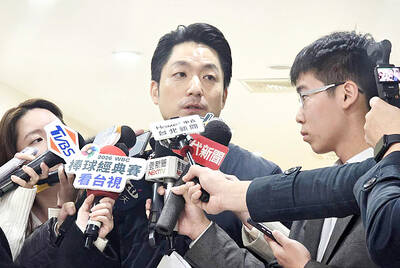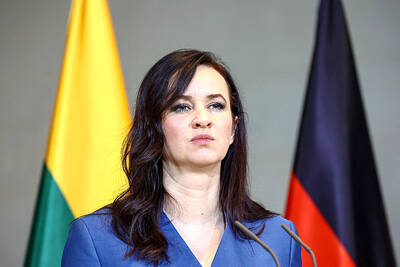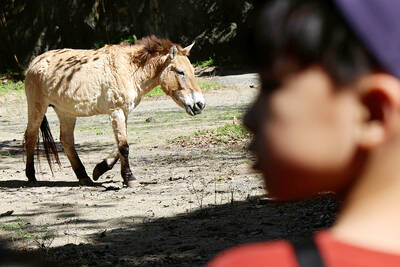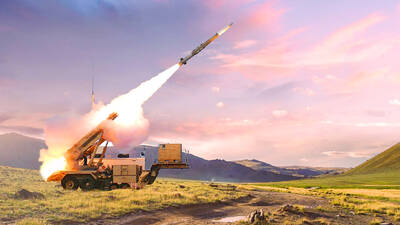For the second day in a row, the US Department of State on Friday refused to confirm whether the Bush administration had imposed a freeze on arms sales to Taiwan, as a spokesman for the department appeared to issue a mild rebuke to Pacific commander Admiral Timothy Keating for stating that a freeze was in place.
The department’s comments came as the Formosan Association for Public Affairs (FAPA) criticized Keating for claiming that the US is not concerned about the freeze’s long-term potential harm to Taiwan’s ability to defend itself against a Chinese attack, while a former senior Pentagon official called on US President George W. Bush to lift the freeze before he leaves office.
Asked about the freeze at his regular daily press briefing, spokesman Sean McCormack repeated a statement issued by Foggy Bottom on Thursday that the administration “faithfully implements the Taiwan Relations Act, under which the United States makes available items for Taiwan to maintain a sufficient defense.”
He refused to go beyond mentioning that the arms sales approval process was an interagency one and that the department does not comment on individual weapons systems under consideration.
Asked about Keating’s disclosure, McCormack said: “I would point you to what I have just given you as the official United States government policy that is applicable for all US government agencies, whether it is the Department of Defense, Department of State or any other part of the US government.”
That statement contrasted with Keating’s assertion, made during a presentation on Wednesday at the Heritage Foundation think tank, that the freeze “is administration policy.”
Keating said that this is because “the folks who make these decisions” have decided there is “no pressing, compelling need at this moment” for sale of the arms package to Taiwan.
In referring to “the folks” during the presentation and in a briefing with reporters afterwards, Keating focused on the role of the White House, State Department and the National Security Council while discounting the role of the Department of Defense, his employer.
Over the years, the Pentagon has been the main proponent of greater arms sales to Taiwan, even as tensions rose between the White House and the State Department, on the one hand, and the government of former president Chen Shui-Bian (陳水扁) on the other. The Department of Defense is said to oppose the freeze and Pacific Command is particularly irked, sources have said.
FAPA entered the fray on Friday with a statement criticizing Keating for saying “I am not overly concerned” about the long-term implications of the freeze, which will hamper Taiwan’s military preparedness in the long term as China continues to modernize.
“Admiral Keating’s statement flies in the face of the most recent Pentagon report on Chinese military power … [in which the Pentagon] expressed concern about the military balance tilting towards China and warned against China’s military projection in the region,” FAPA president Bob Yang (楊英育) said.
Yang also took issue with Keating’s statement that the US Navy regularly consults with the Chinese military on weapons sales to Taiwan.
Yang said that Keating’s statement “is not consistent with [former US] president [Ronald] Reagan’s Six Assurances in which [he] promised Taiwan that the US would not consult with the Chinese on arms sales to Taiwan.”
Also on Friday, a former senior US defense official sharply criticized the Bush administration for freezing the arms sales and called on President Bush to approve the sales before he leaves office in January.
In an article published in the Wall Street Journal on Friday, Ed Ross, the former operations director of the Defense Security Cooperation Agency — the Pentagon organization that handles weapons sales to Taiwan — blamed “high-ranking officials” at the State Department and National Security Council for holding up the sales.
“This is an issue which deserves President Bush’s immediate attention,” Ross said.
Approval of the sales now is especially important, Ross wrote, to help ensure the success of President Ma Ying-jeou’s (馬英九) diplomatic opening to Beijing.
“Beijing has proven all too often that it will demand much and give little and that it sees the use and threat of force as an instrument of diplomacy,” he said.
“As Taiwan enters this challenging period of detente with China, it needs strong US moral and material support more than ever. By taking action on US arms sales to Taiwan before he leaves office, President Bush would bolster a democratic Taiwan and make it much easier for his successor to withstand pressure from Beijing as arms sales contracts are concluded and weapons systems are delivered,” he said.
Ross said that over the past eight years, the Chinese Nationalist Party (KMT)-dominated Legislative Yuan’s consistent refusal to approve budgets for US arms purchases and worsening relations between Chen and Bush had done “considerable” damage to Taiwan’s military position vis-a-vis China.
“Mutual confidence between Taipei and Washington may have been permanently weakened” at a time in which “the US was becoming increasingly dependent on improved US-China relations … The US has become increasingly reluctant to take the heat from China over weapons sales,” he said.

The Taipei City Government yesterday confirmed that it has negotiated a royalties of NT$12.2 billion (US$380 million) with artificial intelligence (AI) chip giant Nvidia Corp, with the earliest possible signing date set for Wednesday next week. The city has been preparing for Nvidia to build its Taiwan headquarters in Beitou-Shilin Technology Park since last year, and the project has now entered its final stage before the contract is signed. Taipei Mayor Chiang Wan-an (蔣萬安) said the city government has completed the royalty price negotiations and would now push through the remaining procedures to sign the contract before

The Ministry of Foreign Affairs on Thursday said the name of the Taiwanese Representative Office in Lithuania was agreed by both sides, after Lithuania’s prime minister described a 2021 decision to let Taiwan set up a de facto embassy in Vilnius as a “mistake.” Lithuanian Prime Minister Inga Ruginiene, who entered office in September last year, told the Baltic News Service on Tuesday that Lithuania had begun taking “small first steps” aimed at restoring ties with Beijing. The ministry in a statement said that Taiwan and Lithuania are important partners that share the values of freedom and democracy. Since the establishment of the

Taipei Zoo welcomes the Lunar New Year this year through its efforts to protect an endangered species of horse native to central Asia that was once fully extinct outside of captivity. The festival ushering in the Year of the Horse would draw attention to the zoo’s four specimens of Przewalski’s horse, named for a Russian geographer who first encountered them in the late 19th century across the steppes of western Mongolia. “Visitors will look at the horses and think that since this is the Year of the Horse: ‘I want to get to know horses,’” said zookeeper Chen Yun-chieh, who has been

‘T-DOME’: IBCS would increase Taiwan’s defense capabilities, enabling air defense units to use data from any sensor system and cut reaction time, a defense official said A defense official yesterday said that a purported new arms sale the US is assembling for Taiwan likely includes Integrated Battle Command Systems (IBCS). The anonymous official’s comments came hours after the Financial Times (FT) reported that Washington is preparing a US$20 billion arms sale encompassing “Patriot missiles and other weapons,” citing eight sources. The Taiwanese official said the IBCS is an advanced command and control system that would play a key role in President William Lai’s (賴清德) flagship defense program, the “T-Dome,” an integrated air defense network to counter ballistic missiles and other threats. The IBCS would increase Taiwan’s